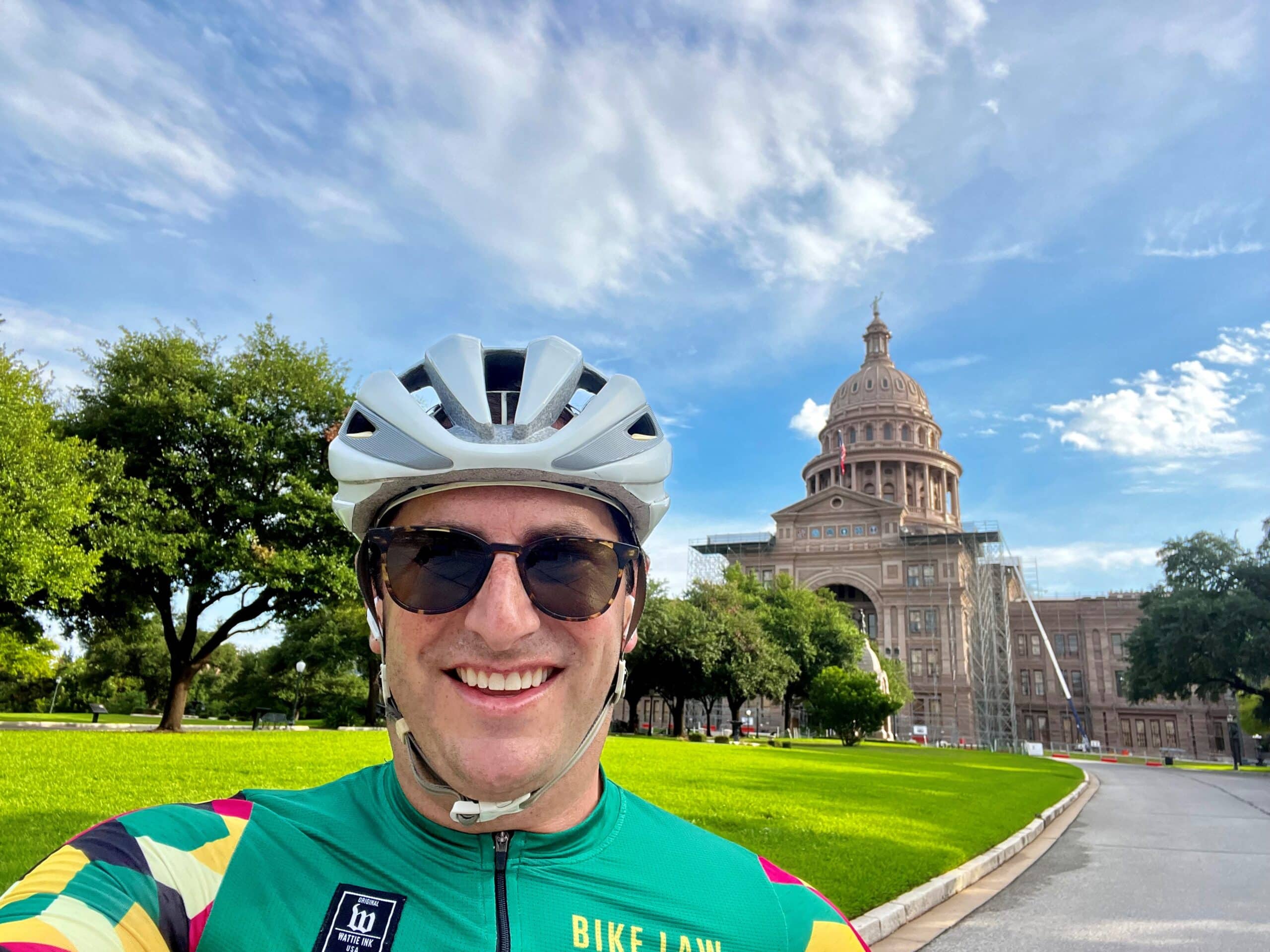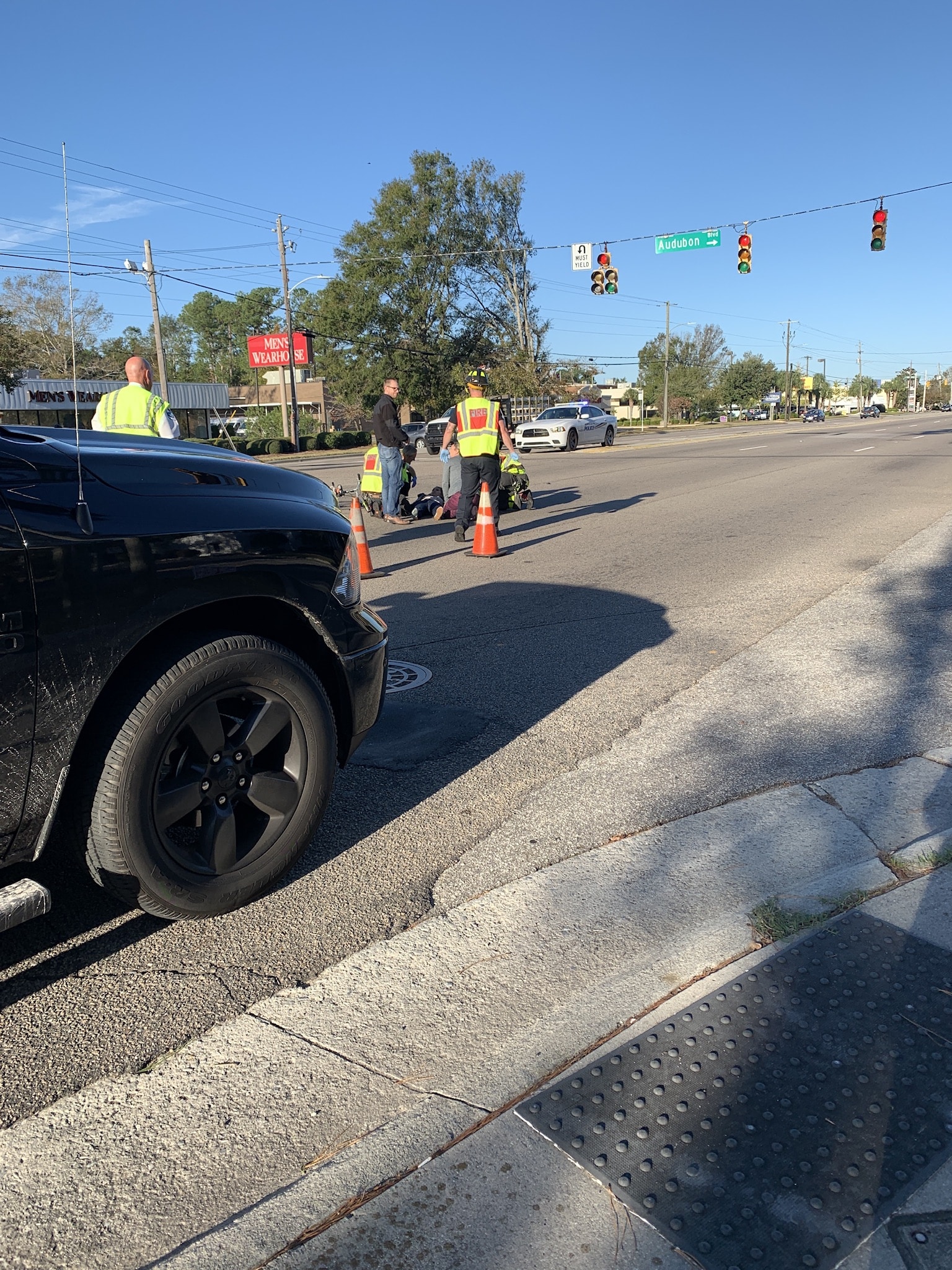Cyclist hit, cyclist injured, cyclist ticketed. Police wrong. Jury right!
He had just been launched skyward by the front end of a pickup truck. Now the police were giving him a ticket.
Jason was riding his road bike in the travel lane of North River Road in Libertyville, Illinois with his father-in-law and two friends when an impatient teenaged driver in a Toyota Tacoma pulled behind the group. The road had one southbound lane and one northbound lane divided by solid double yellow lines. The shoulder of the narrow, rural road was a mix of dirt and loose gravel. The T-intersection of River and Guerin Road was approaching, and Jason, leading the group, planned to make a left turn. The young driver planned to pass. The pickup truck, now traveling south in the northbound lane, zipped passed one, two, three bikers. He reached Jason at the intersection and when Jason turned left he was met with the grill of the large vehicle.
Jason, a 41 year old married father of two young boys, and his riding companions, all in their 60s and 70s, were met at the scene with hostility from a responding police officer. The driver had clearly broken the law, attempting to pass in an intersection after veering across double yellow lines. But the officer’s focus was on Jason. He and at least one of his companions confirmed that Jason signaled his intent to turn, but the officer chose not to believe them and issued Jason a traffic ticket. The driver, whose parents rushed to the scene, received no citation.
Our Illinois bike law firm represented Jason. The traffic ticket was dismissed when the officer declined to appear in court. But the damage was done. The way the police report was written combined with the issuance of the citation clearly influenced the way the driver’s insurance company, Allstate, viewed the case. The driver and Allstate refused to compensate Jason, believing the collision was entirely his fault. We filed a lawsuit.
The deposition testimony of the responding officer, a deputy with the Lake County Illinois Sheriff’s Police, provided some context for his decision making. We elicited the following from him:
Q: Are you aware of any complaints from citizens in the area about bicyclists traveling on North River Road?
A: All the time.
Q: Tell me about that. Prior to this crash how many such complaints were you aware of?
A: Every week we’d get complaints. It could be on a daily basis. Our command usually fields those phone calls and we’re given extra patrols to try to handle these complaints . . . . The complaints that we get are the bicyclists are either traveling too much in the roadway, not allowing vehicles to pass, then causing traffic hazards, or that they are not stopping at stop signs, they’re making illegal turns, and the gambit runs on and on and on. So bicyclists in District 2 in the county have been a very big, if you would, thorn in the side when it comes to warmer weather. . . . Unfortunately, they don’t want to follow by the same rules, unless we start to enforce them. Once we start to enforce them, then it’s, you know, we’re picking on them. So, yes, there’s been a very huge outcry of complaints of bicyclists in District 2 and specifically River Road.
* * * * *
Q: Were there ever any meetings or directives issued within the department about how to deal with this situation?
A: Sure.
Q: And what was discussed?
A: Write them. Write them traffic tickets.
During his deposition, the officer said that he understood that there was nothing illegal per se about bicyclists riding on River Road. He also admitted that the travel lane on River Road in the 100 yards or so north of Guerin provided the safest place of a cyclist to be, rather than on the gravel strewn shoulder. He knew that double yellow lines mean no passing. He understood that the Illinois Vehicle Code permits bicyclists to leave the right side of the roadway when preparing to make a left turn.
Why then did he ticket our client but not the teenaged driver?
The following passage from the officer’s deposition perhaps sheds some light onto how he views such situations:
Q: Do you feel that it was improper of the driver . . . to have attempted to pass the bicyclists across the double yellow line?
A: No.
Q: Why not?
A: It’s an everyday occurrence out there when you’re talking bicyclist. If he comes over a hill and you’re moving – and the bicyclists are moving slower than what the posted speed limit is and you come over the hill and you now have this option to either run them over because, as you said, the lanes are substandard to fit both vehicles and bicyclists in it or to go around them, do the later part and go around them.
It should be noted that this was not a situation in which the driver’s move into the opposite lane was an evasive maneuver. He had been behind the bicyclists for several seconds before deciding to pass. They had simply been an obstacle in his way to get to where he wanted to go.
Through years of litigation the driver and his insurer refused to offer a dime of compensation to Jason and it became necessary to go to trial. During the jury instructions conference with the judge the theme of bicyclist as roadway obstacle arose again. At the conclusion of a jury trial, members of the jury are instructed, in writing, what the applicable law is and how they should apply the facts to the law to render a verdict for one side or the other. During the conference it was suggested that the jury be allowed to consider whether a bicyclist is a roadway obstruction. Section 11-701 of the Illinois Vehicle Code states:
Upon all roadways of sufficient width a vehicle shall be driven upon the right half of the roadway, except as follows:
- When overtaking and passing another vehicle proceeding in the same direction under the rules governing such movements;
- When an obstruction exists making it necessary to drive to the left of the center of the roadway.
The implication was that if the jury felt that Jason was an “obstruction” then the law allowed the driver to cross the double yellow line to pass.
I vehemently opposed such an instruction. A bicyclist — certainly not an adult riding where he was legally permitted to be – could never be labeled an obstruction. The word obstruction is not defined in the vehicle code nor is there any Illinois case law defining it. But surely a legal road user could not be that. An obstruction is a fallen log, a deer carcass, a disabled car; not a vehicle simply going slower than the driver behind him preferred. The judge, however, was unpersuaded and allowed the jury to be instructed that if they felt Jason was an obstruction then the defendant did not violate the ban on solid line crossing.
The jury did not buy it!
In the end we won the trial, the jurors finding that the driver was mostly at fault for causing the crash. They did assign some fault to Jason, 30% versus 70% for the driver. We were not permitted to interview jurors after the trial’s conclusion, but it seems that they did not think that Jason signaled, or perhaps did not signal sufficiently. But we were heartened that the attitude expressed by the police officer was rejected and the Court’s invitation to label a bicyclist an obstruction did not carry the day.










